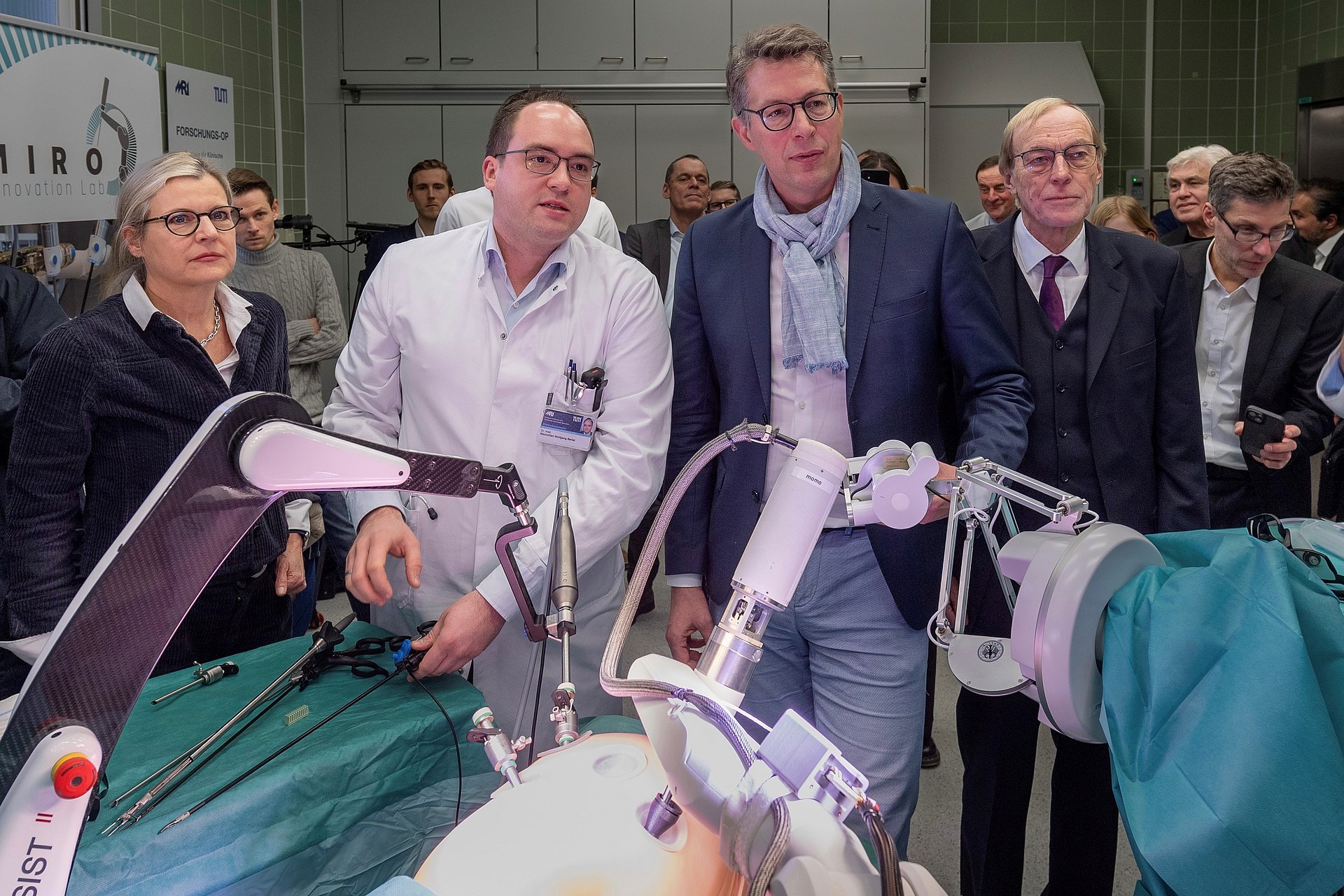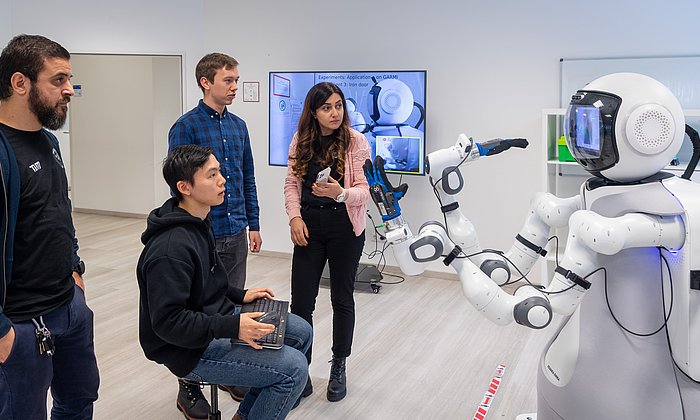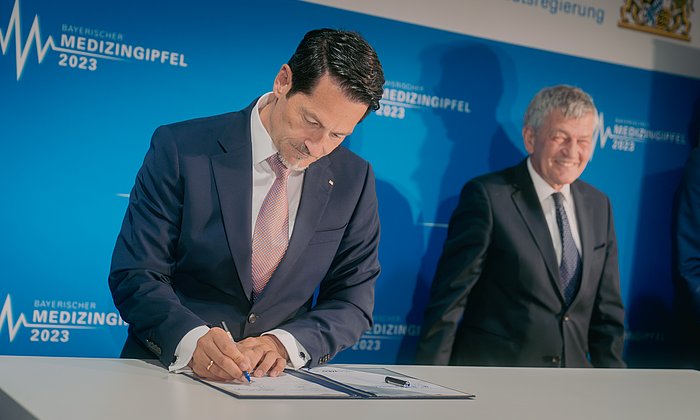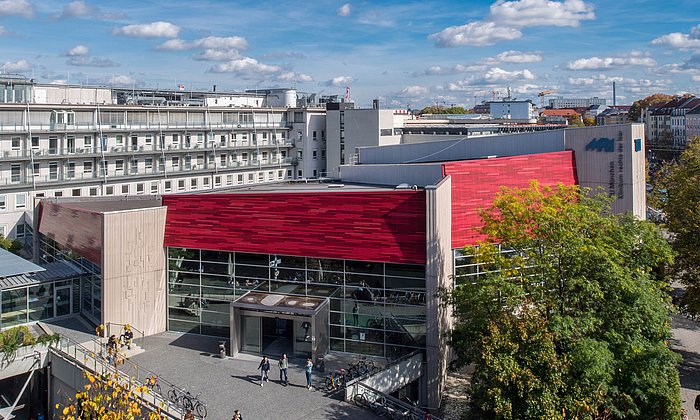Bavarian Research Foundation supports robotics research
TUM receives funding for medical robotics project

It is primarily smaller or particularly precise procedures that will soon be performed more frequently with the help of robots. However, this also means that clinical workflows in the operating room will become even more complex and require the most efficient processes possible. The Research Network for Seamless and Ergonomic Integration of Robotics in Clinical Workflows (ForNeRo) comes in here. The Bavarian Minister of Science, Markus Blume, has now presented the Bavarian Research Foundation's funding decision at TranslaTUM at TUM's Rechts der Isar Hospital.
"Digital revolution in the operating room"
Science Minister Markus Blume says: "Top-class start-ups, leading companies, and excellent health research: with the ForNeRo research network, we support a Bavarian dream team in innovative medical technology! Thanks to the pooling of highly specialized expertise in robotics and AI, robotic assistance systems are to be optimally integrated into clinical workflows. This enables maximum individual precision and safety for each patient, even in complex procedures, while simultaneously relieving the surgeon's workload. We are happy to support this digital revolution in the operating room with two million euros from a call for funding from the Bavarian Research Foundation to support our High-Tech Agenda Bavaria!"
Prof. Arndt Bode, President of the Bavarian Research Foundation, adds: "Research alliances are the premier class of funding formats and the flagship of the Bavarian Research Foundation. The ForNeRo research alliance, which has already received the top rating of "excellent" in the evaluation, promises excellent and highly usable results for the economy and society in Bavaria."
Medical scientist Prof. Juliane Winkelmann, Senior Vice President of TUM, emphasizes: "The funding for this highly interdisciplinary project underlines the comprehensive expertise that we have already built up at TUM in the field of medical robotics, among others. Bavaria's collaboration between science and industry is another example of the synergy required to develop and implement innovative medical solutions. This approach can be found at TUM across departmental and subject boundaries."
TUM President Prof. Thomas F. Hofmann points out the strategic importance of the medical robotics project: "The increasing use of robotics will decisively advance precision medicine in particular. With its University Hospitals rechts der Isar and the Heart Center Munich, as well as Europe's leading research in the field of AI and robotics, TUM has a unique combination of cutting-edge expertise in this area. We are bringing these together as part of the Excellence Initiative of the German federal and state governments and can thus establish pioneering new treatment methods."
Cooperation project under the leadership of TUM
ForNeRo is led by the Chair of Ergonomics at TUM under Prof. Klaus Bengler and also draws on the scientific expertise of TUM's Rechts der Isar Hospital, Friedrich-Alexander-Universität Erlangen-Nürnberg (FAU) and the German Aerospace Center (DLR). Together with industrial partners from Bavaria, the team aims to significantly improve workflows in the operating room.
The multidisciplinary alliance focuses specifically on the highly complex challenges of seamlessly integrating robotic assistance systems into clinical processes. The focus is on improving efficiency and safety in the medical field. Using state-of-the-art technologies such as machine learning and augmented reality aims to optimize robotic systems' planning, placement, and use. In addition, the project focuses on the ergonomic and user-centered design of robot assistance to optimize workflows and thus relieve the burden on operating room staff.
The interdisciplinary research network is made up of scientific and industrial partners. In addition to the Chair of Ergonomics, TUM is also involved in the project with the Chair of Applications in Medicine. The Klinikum rechts der Isar is represented by the Polyclinic for Ophthalmology and the Minimally Invasive Interdisciplinary Therapeutic Interventions research group. FAU is contributing the Department of Artificial Intelligence in Biomedical Engineering as a partner, while DLR is involved with the Miro Innovation Lab at the Institute of Robotics and Mechatronics.
From industry, the companies Karl Storz VentureONE Germany GmbH, ITK Engineering GmbH, ImFusion GmbH, AKTORmed GmbH, and Custom Surgical GmbH are supporting the research alliance.
Technical University of Munich
Corporate Communications Center
- Andreas Huber
- presse@tum.de
- Teamwebsite
Contacts to this article:
Dr.-Ing. Manuel Ferle
Technical University of Munich
ForNeRo project manager
Chair of Ergonomics



